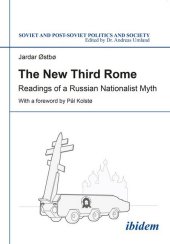 Neuerscheinungen 2016Stand: 2020-02-01 |
Schnellsuche
ISBN/Stichwort/Autor
|
Herderstraße 10
10625 Berlin
Tel.: 030 315 714 16
Fax 030 315 714 14
info@buchspektrum.de |

P†l Kolst›, Jardar ťstb›
(Beteiligte)
The New Third Rome
Readings of a Russian Nationlist Myth
With a Forewaord by P†l Kolst›
2016. 292 p. 21 cm
Verlag/Jahr: IBIDEM 2016
ISBN: 3-8382-0870-6 (3838208706)
Neue ISBN: 978-3-8382-0870-1 (9783838208701)
Preis und Lieferzeit: Bitte klicken
This in-depth analysis discloses the sources, contents, and implications of post-Soviet Russian messianism. Since its rediscovery 150 years ago, writers ranging from Western critics of Moscow´s foreign policy to ardent Russian imperialists have used the concept of Moscow as the Third Rome as ´evidence´ of Russia´s particularism and expansionism. But for the original author of the formula of the Third Rome, the Orthodox monk Filofei of Pskov, it was a religious concept he referred to when criticizing what he saw as the apostasy of his time.
This book is the first to look beyond this dichotomy. Drawing on theories of political myth and concepts of nationalism, ťstb› develops a novel analytical perspective. Rather than dismissing political uses of the religious, medieval idea as ´wrong´, the author analyzes the modern content and ideological function of the myth of the Third Rome. Through case studies of four prominent nationalist intellectuals, Vadim Tsymburskii, Aleksandr Dugin, Nataliia Narochnitskaia and Egor Kholmogorov, the author shows how this messianic myth is used to ´reinvent´ Russia after the collapse of the Soviet Union. These writers use their own constructed image of the Russian nation to demonstrate what Russia ´should be´ and its allegedly rightful place in the world. Existing in radically diverging versions, the myth of the Third Rome routinely conveys rabid anti-Westernism. At ´best´, it is employed to forge a self-image of the Russians as an essentially isolationist civilization. At worst, it is used to ´explain´ how the Russians are divinely elected to be the rulers of a world empire.
Dr. Jardar ťstb› studied East European affairs, the history of ideas, and Slavic languages at the Universities of Oslo and Bergen. ťstb› has worked as a political analyst in the Norwegian Army and a translator of Russian and Albanian literature. Currently, he is a postdoctoral fellow with the Norwegian Research Council project ´New Political Groups and the Russian State´. ťstb›´s papers have appeared in, among others, Nordisk ťstforum, Forum noveishei vostochnoevropeiskoi istorii i kul´tury, Digital Icons, and The Borders of Europe (Aarhus UP 2012).


